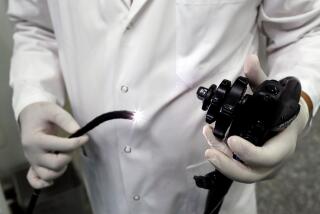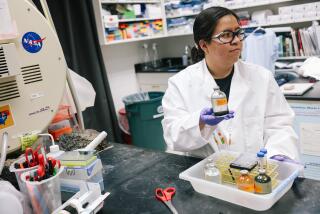Human gut may engineer its bacterial environment via secretions
The human gut may help control the bacterial populations that live within it via secretions that kill some bacteria while supporting others, according to a study published Tuesday in the journal PLoS Biology.
The gut is an enormously complex environment inhabited not only by human cells but also by trillions of bacteria. Some of those bacteria actively aid us by improving digestion (hence the term “probiotic”), producing useful compounds like vitamins, or providing resistance against pathogens.
But many if not most probably do little at all to benefit humans, instead mooching off the gut’s nutrient-rich environment to survive without giving much back in return. And some denizens of this microbiome actually do us harm. This raises a problem for the gut: How can it support the good bacteria while discouraging the rest? Such a question is particularly vexing because bacterial strains don’t all grow at the same speed, meaning that beneficial strains that grow more slowly would soon be overtaken by harmful, faster-growing bacterial colonies without a way for the body to select some species over others.
To answer that question, Jonas Schluter and Kevin Foster of Oxford University developed a computer model that replicates a simplified version of the gut. Their goal: To see whether slight differences in the gut’s secretions, which have the power to aid or inhibit bacterial growth, might be able to bias the gut’s environment toward beneficial strains of bacteria.
Though the study was performed with a computer model instead of in a biology lab, the idea has biological support: The gut lining, known as the epithelium, is known to secrete nutrients that help bacteria grow, as well as antibacterial substances that kill off bacteria. What’s more, different secretions don’t impact all bacteria equally, raising the possibility that the right combination of secretions might create a gut more friendly to processes like digestion.
When Schluter and Foster ran their model, they found that a gut capable of using its secretions to allow beneficial bacteria to grow 5% to 10% faster than normal saved such bacteria even when the initial conditions of the environment were against their survival. And while many researchers have focused on the power of the antimicrobial factors that kill bacteria, Schluter and Foster’s model indicates that factors that encourage growth are even more important.
One example of this, the Oxford researchers write, is the production of glycoconjugates, which are essentially carbohydrates. There are many types of glycoconjugates produced in the mammalian gut, and each is capable of supporting the growth of different microbial species. Produce the right combination of glycoconjugates, the researchers suggest, and you will amplify some species while discouraging others.
Return to the Science Now blog.






